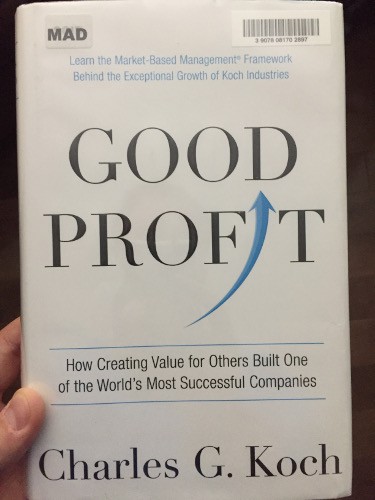Good Profit

I’ve had Good Profit by Charles Koch on my to-read list for a while, and I finally picked up a copy at the library. Whatever you may think of the Koch family or empire, it’s hard to argue that they’ve been unsuccessful in business. The book lays out the “Market-Based Management” business philosophy Koch has developed over his career and which he uses to run his company.
In the first chapter of the book, Koch proudly states that the value of his company grew from $21M in 1961 to $100B today, and that this growth is 25x that of the S&P 500 over the same period. The cynic in me wonders if this truly impressive growth could be based more on the company’s primary vertical (oil refinement) than on the superiority of its business principles. In the U.S., oil consumption has more than doubled since Charles Koch took over his father’s company in 1967, and various political and economic pressures have created market forces favoring domestic production. One could argue that most oil-producing companies have seen growth in stock value and profits over this time period, and that Koch Industries is not especially unique in the industry.
Nevertheless, I found Good Profit to be an interesting read. Its central tenet is differentiating good profit from bad profit. A staunch libertarian, Charles Koch argues that many government regulations disrupt natural market forces and create opportunities for what Koch calls “profit by coercion”, or an increasing reliance on corporate welfare. In order to make good profit, Koch says, a company must continually innovate and create value for its customers. Imagine that — the CEO of a large company arguing against lobbying and special tax incentives!
Koch’s Market-Based Management philosophy is based on five dimensions: Vision, Virtue and Talents, Knowledge Processes, Decision Rights, and Incentives. These are all interesting facets, but personally, I found the last dimension (incentives) most fruitful for reflection. Koch argues that incentives based on staying within budget create risk aversion which stifles innovation. Instead, he says, incentives must be based on created value. While I agree with this in principle, in practice I think it’s very difficult — often impossible — to accurately measure how much value a division, team, or individual has created. (Koch’s book is notably light on concrete examples of how to make these estimations.) Even so, I think the following questions are useful to think about:
- Am I truly earning my salary? What’s the value I add to my company or our customers? Can I quantify it?
- What can I do to add more value to my company and our customers?
Overall, I enjoyed Good Profit. It’s an interesting peek behind the curtain of a large, successful business, and a thought-provoking treatise on economics, management, and leadership from someone with a lot of experience.